Those who render me evil for good accuse me because I follow after good. Do not forsake me, O Lord! O my God, be not far from me! — Psalm 38:20–21
Evil is more than the sum of present circumstances. When we reduce the idea of evil down to its discrete occurrences we not only underestimate its profound power in our world, but risk missing the ultimate solution.
- If evil is simply the events that fill our news apps each morning, then the solution is simply the return of stasis to an off-balance world.
- If evil is a material problem, then it has a material solution. Each time there is a mass shooting in the U.S. science runs to explain the cause in terms of psychology and biology—the message is clear: solve the problem in our genome and tragedies go away.
- If evil is just the fringes of humanity run amok, then we are able to deal with it on our own through governance and jurisprudence.
Christianity depicts evil in all its darkness. Evil is not an illusion; it’s deeper than circumstance—piercing our hearts and wounding our souls. Evil is spiritual before it is material—making each of us victim and perpetrator of its sting.
And so the intellectual exercise begins: if God is truly good, he must not be powerful enough to stop evil. And if he’s truly powerful, he must not be good enough to care.
The authors of Scripture depict God not only as good and powerful, but as sacrificial. Evil runs so deep in our world that the solution—the restorative power of the cross—tore the trinity apart.
Yet rather than holding the cross and resurrection as a miracle that ushers in global restoration and re-creation, recent misconceptions in Christian theology have reduced Christ’s sacrifice to a mechanism that establishes individual merit before God. This view essentially holds individual atonement as its own category—relegating “the problem of evil” to an intellectual exercise that is as complex as it is unsolvable.
We can turn our eyes to him who has paid a price we could not pay, and offered a solution we could not generate; or we can shake our fists and blame him for the evil we see. Though if we were to pronounce a sentence appropriate for a God that would create this kind of world we find he has already served it.
Today’s Reading
Ezekiel 2 (Listen – 1:38)
Psalm 38 (Listen – 2:14)






